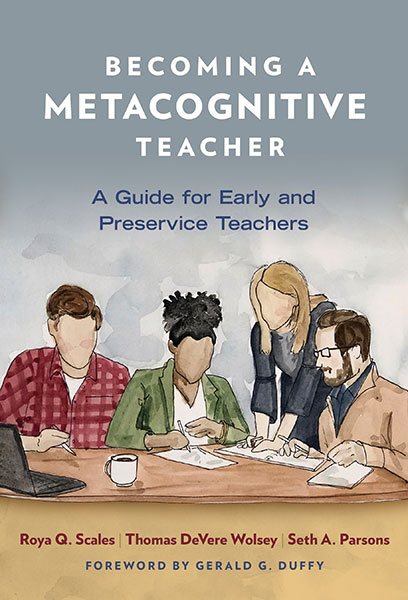Professors: Request an Exam Copy
Print copies available for US orders only. For orders outside the US, see our international distributors.
Roya Q. Scales, Thomas DeVere Wolsey, Seth A. Parsons
Foreword by: Gerald G. Duffy
Publication Date: May 29, 2020
Pages: 160

How can early and preservice teachers master the complex practice of teaching? This clearly written, research-based guide shows how to successfully navigate coursework, build relationships with mentors, and negotiate fieldwork and student teaching while developing metacognitive thinking skills. These are skills that allow teachers to continuously reflect on instructional practices and adapt them to fit their own teaching context and their students’ diverse needs. Metacognitive teaching requires higher-level thought processes that, for teachers, include making connections among each segment of the teacher preparation program, as well as deciding how these experiences directly and effectively apply to their classrooms. The authors argue that this kind of support is needed early in the journey of a teacher if they are to succeed and remain in the classroom.
Book Features:
Roya Q. Scales is professor of literacy education at the School of Teaching and Learning, Western Carolina University. Thomas DeVere Wolsey teaches in the Graduate School of Education at The American University in Cairo, Egypt. Seth A. Parsons is associate professor of education in the School of Education and the Sturtevant Center for Literacy at George Mason University.
“ Becoming a Metacognitive Teacher is a rich assemblage of theory, cases, and resources, which is essential to make metacognitive teaching a tangible reality for novice teachers.”
—Teachers College Record
“Intended as a guidebook to help early career teachers develop professional competencies, Becoming a Metacognitive Teacher: A Guide for Early and Preservice Teachers by Scales, Wolsey, and Parsons is a reader-friendly, accessible textbook that breaks down the processes of coursework, field experiences, student teaching, and one’s first year in the classroom. As such, it is a highly effective resource for both preservice teachers who hope to understand their practice and teacher educators who want to scaffold the reflective process.”
—NCTE English Education
“This book emphasizes that teaching is a deadly serious, demanding, thoughtful, pragmatic art. It pulls no punches about how difficult it is to create a productive learning environment for the 20–30 divergent students under your care in the harried environment of classrooms, and that to succeed you need a proactive, focused mental stance, a reflective, thoughtful approach, and the energy to orchestrate multiple pedagogical variables in response to constantly varying conditions.”
—Gerald G. Duffy, professor emeritus, Michigan State University
“To foster metacognitive thinking among our students, teachers must have sophisticated metacognitive skills themselves. This unique and well-grounded text demonstrates the critical role of metacognition in developing the craft of effective teaching for preservice and novice teachers."
—William Brozo, professor of literacy, School of Education, George Mason University
“Comprehensive and practical, this text provides an artful and thoughtful blend of strategies for prospective teachers' personal and professional development. The goal of developing thinking teachers who keep their students at the forefront is supported with the author’s discussion of their and others’ personal and research histories, rich vignettes, and access to multiple digital resources (e.g., TED talks, blogs, instructional videos). A text for both teacher educators and prospective teachers.”
—Victoria J. Risko, professor emerita, Vanderbilt University
Contents (Tentative)
Foreword Gerald G. Duffy
Preface
Acknowledgments
1. Evidence-Based and Metacognitive Teaching: A Brief Overview
Considering Your Plans for Teaching
Reflecting on Teaching
Thinking about Metacognition
How to Make the Most of This Book
Contemplate This Vision of Teaching
Further Readings and Resources
2. Metacognitive Practice from Student Teaching to Novice Teaching: Fitting the Pieces Together
Anticipating the Chapter Topics
Your Transitioning Role
Metacognition and Metacognitive Teaching
Teacher Knowledge and Metacognitive Teaching
What Are the Characteristics of Metacognitive Teachers?
The Effectiveness of Metacognitive Teaching
Reflecting on This Chapter
Further Readings and Resources
3. Focusing on Coursework for Professional Background Knowledge
Anticipating the Chapter Topics
Signature Aspects of Teacher Preparation Programs
Choosing your Teacher Preparation Program–What Stands Out?
Navigating the Activity of Teaching
Metacognitive Teaching as Knowledgeable Navigation
The Metacognitive Teaching Cycle
Reflecting on This Chapter
Further Readings and Resources
4. The Complexity of Becoming a Teacher in University, School, and Classroom Contexts
Anticipating the Chapter Topics
Experiencing Differing Contexts—An Example
Plotting a Course in a Complex Context
Reflecting on This Chapter
Further Readings and Resources
5. Connecting Coursework to Instruction
Anticipating the Chapter Topics
Pre-requisites for Adaptations
How Can You Learn About Teaching from Lesson Planning?
How Can You Learn About Teaching While Teaching (In-the-Moment)?
How Can You Learn About Teaching After Teaching, as You Reflect on What You Taught?
Reflecting on This Chapter
Further Readings and Resources
6. Negotiating Classroom Complexity
Anticipating the Chapter Topics
The Teaching Journey
The Arc of a Teaching Career–DeVere’s Experiences
Teaching: An Ill-Structured Domain
Fitting the Pieces of the Teaching Puzzle Together
Reflecting on This Chapter
Further Readings and Resources
7. Your Teaching Journey
Anticipating the Chapter Topics
Growing in Teaching Over Time
Building on the Foundation
Achieving Balance
The Best Job in the World
Reflecting on This Chapter
Further Readings and Resources
Appendix: Supplementary Materials for Course Instructors, Mentor Teachers, Instructional Coaches, and Administrators
Glossary
References
Index
About the Authors
Professors: Request an Exam Copy
Print copies available for US orders only. For orders outside the US, see our international distributors.